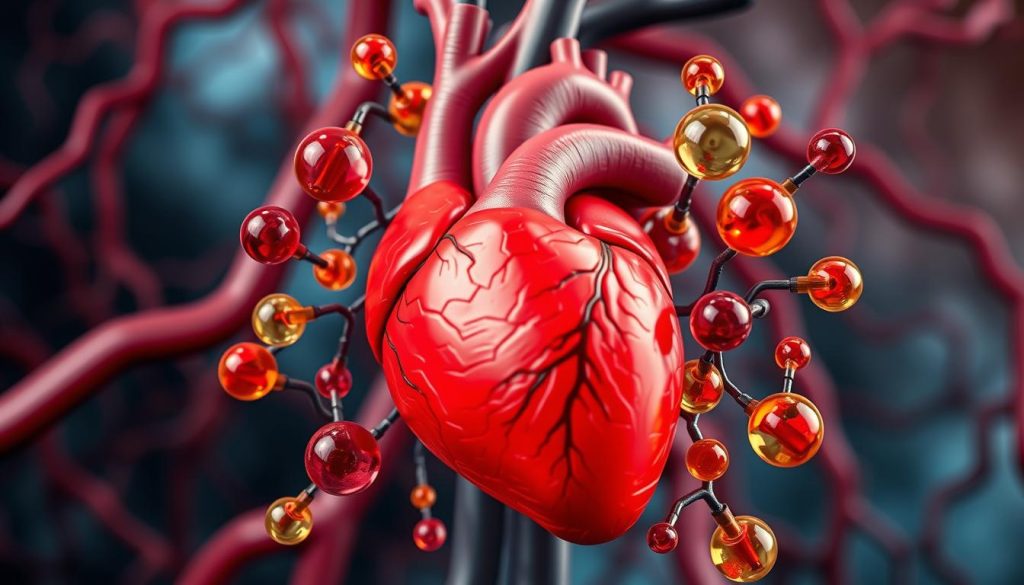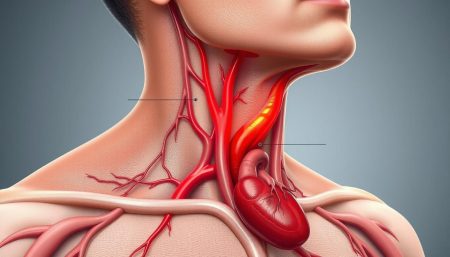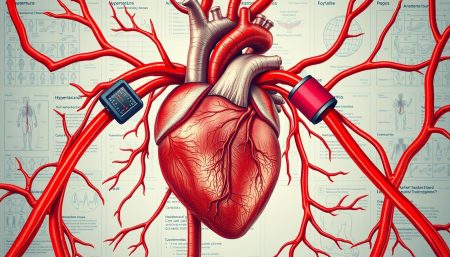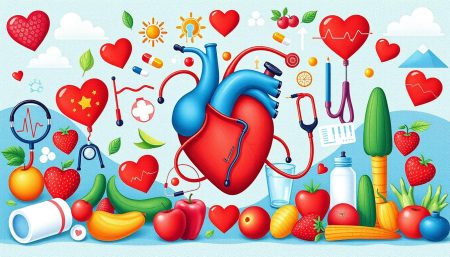High cholesterol and heart disease are related but different. High cholesterol is a risk factor for heart problems, not a disease itself. Knowing this is key to understanding how cholesterol affects our health.
Cholesterol is important for our body’s functions, but too much is dangerous. It can clog arteries, leading to heart attacks and strokes. This shows why managing cholesterol levels is so important.
We will look at how different cholesterol types affect our heart. We’ll also talk about how to keep our cholesterol levels healthy. Knowing these details helps us protect our heart and overall health.
Understanding the Relationship Between High Cholesterol and Cardiovascular Disease
Cholesterol is a key player in heart health. It’s made by our bodies and found in food. But, too much can raise the risk of heart disease.
The Role of Cholesterol in Heart Health
Cholesterol helps build cell walls and makes hormones. It moves through our blood in lipoproteins. These lipoproteins are important for heart health or can cause problems.
Different Types of Cholesterol: HDL vs LDL
Cholesterol isn’t all the same. HDL, or “good” cholesterol, helps clear out bad stuff. LDL, or “bad” cholesterol, can clog arteries if it’s too high.
| Cholesterol Type | Effect on Heart Health | Ideal Levels |
|---|---|---|
| HDL (High-Density Lipoprotein) | Protective | 60 mg/dL or higher |
| LDL (Low-Density Lipoprotein) | Potentially harmful | Less than 100 mg/dL |
Impact on Blood Vessels and Heart Function
Too much LDL cholesterol can cause plaque in arteries. This is called atherosclerosis. It can narrow blood vessels and increase the risk of heart attacks and strokes. Keeping cholesterol levels in check is key to heart health.
It’s important to check cholesterol levels regularly. This helps understand heart health. Knowing how cholesterol affects the heart can help us stay healthy and avoid heart problems.
Is High Cholesterol Considered A Cardiovascular Disease
High cholesterol, also known as hyperlipidemia or dyslipidemia, isn’t a cardiovascular disease itself. Yet, it greatly raises the risk of heart problems. The link between cholesterol and heart health is complex, with many factors playing a role.
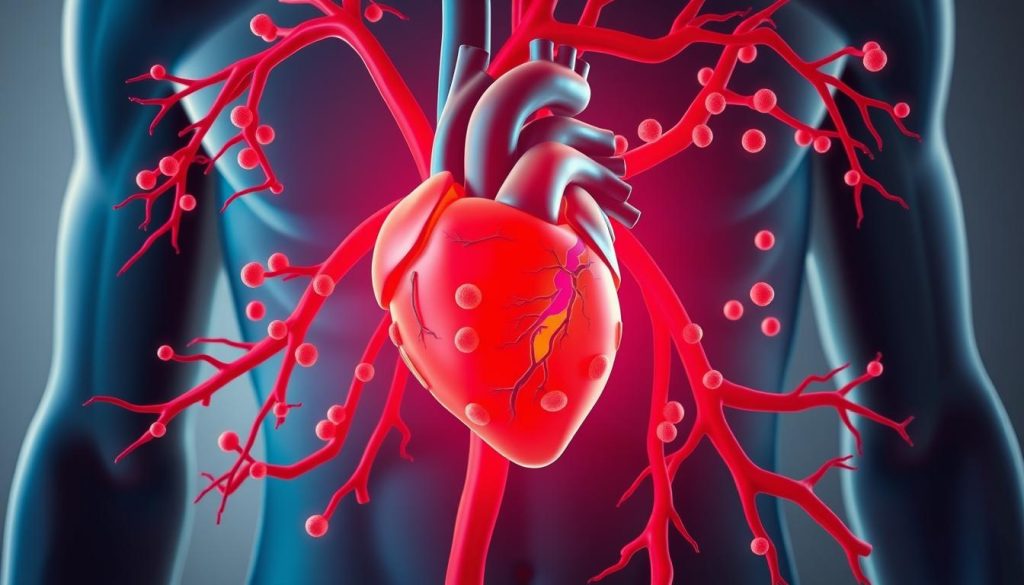
High cholesterol isn’t a heart disease, but it’s a big risk factor. Too much cholesterol in the blood can cause plaque to build up in arteries. This is called atherosclerosis. It narrows blood vessels and leads to many heart issues.
“High cholesterol is a precursor to cardiovascular disease, not the disease itself. It’s like kindling for a fire – it sets the stage for serious heart problems.”
It’s important to understand the difference for prevention and treatment. Here’s how cholesterol levels affect heart risk:
| Cholesterol Level | Cardiovascular Risk | Recommended Action |
|---|---|---|
| Normal | Low | Maintain healthy lifestyle |
| Borderline High | Moderate | Lifestyle changes, possible medication |
| High | High | Aggressive treatment, lifestyle changes |
By controlling cholesterol with diet, exercise, and meds when needed, you can lower heart disease risk. This includes coronary artery disease.
How High Cholesterol Leads to Atherosclerosis
High cholesterol can start a chain of events leading to atherosclerosis. This serious condition raises the risk of heart problems. It happens slowly, causing damage to the arteries and harming the heart.
Plaque Formation Process
High cholesterol means more LDL cholesterol in the blood. This excess starts forming plaque on artery walls. As time goes on, these fatty deposits grow and harden, narrowing the arteries and reducing blood flow.
Arterial Wall Damage Development
Plaque buildup causes inflammation in the arterial walls. This inflammation damages the arteries, making them stiff and more likely to rupture. The cycle of plaque and inflammation speeds up the damage.
Progressive Nature of Atherosclerotic Disease
Atherosclerosis gets worse over time if not treated. As plaque builds up and arteries narrow, the risk of blood clots grows. These clots can block blood flow, leading to heart attacks or strokes. It’s important to manage cholesterol levels and slow atherosclerosis with regular check-ups and lifestyle changes.
“Atherosclerosis is like rust slowly corroding a pipe. It doesn’t happen overnight, but without proper care, it can lead to devastating consequences.”
Risk Factors Contributing to Elevated Cholesterol Levels
Knowing about cholesterol risk factors is key to keeping your heart healthy. Many things can affect your cholesterol levels. These include your genes and your lifestyle.
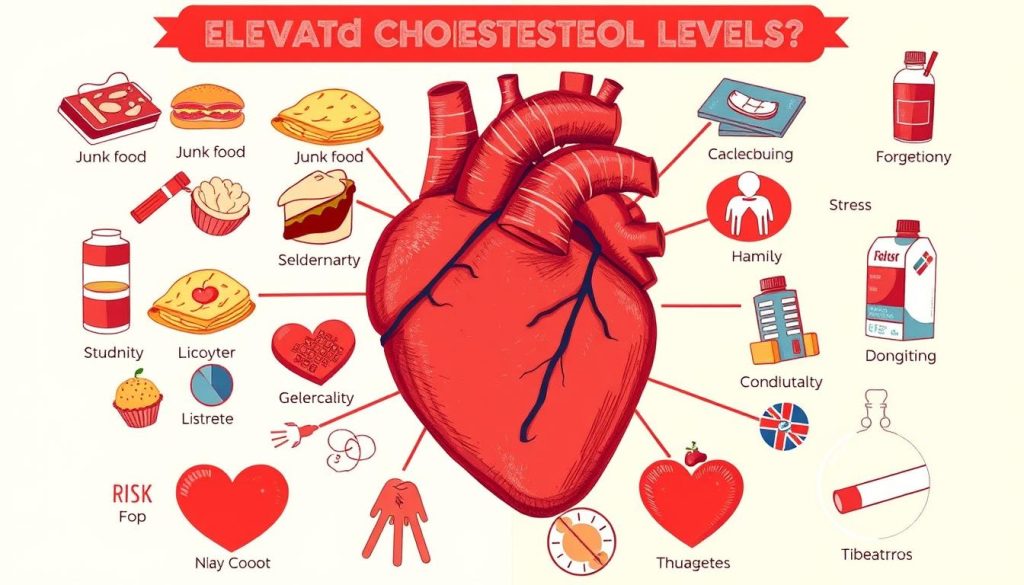
Genes play a big role in cholesterol levels. Some people are born with genes that make their bodies produce too much cholesterol. This makes it harder to control cholesterol levels, even with a healthy lifestyle.
How you live affects your cholesterol too. Not moving enough, smoking, and drinking too much alcohol can raise your cholesterol. But, exercising regularly can increase good cholesterol and lower bad cholesterol.
What you eat also matters a lot. Eating foods high in bad fats can increase bad cholesterol. But, eating more fruits, veggies, whole grains, and lean proteins can help keep cholesterol levels healthy.
- Age and gender: Cholesterol levels tend to rise as we get older, and men generally have higher levels than women before menopause.
- Weight: Being overweight or obese can lower HDL cholesterol and increase LDL cholesterol.
- Medical conditions: Certain health issues, such as diabetes and hypothyroidism, can affect cholesterol levels.
By knowing these risk factors, you can take steps to manage your cholesterol. Regular health checks and making lifestyle changes are important. They help keep your cholesterol levels in check.
Diagnosing High Cholesterol and Cardiovascular Complications
Finding high cholesterol and heart problems early is key to staying healthy. Doctors use different ways to spot these issues and figure out your heart risk.
Lipid Panel Testing Methods
A lipid panel is a blood test that looks at your blood fats. It checks your total cholesterol, LDL (bad) cholesterol, HDL (good) cholesterol, and triglycerides. This test helps doctors see how healthy your heart is and if you need treatment.
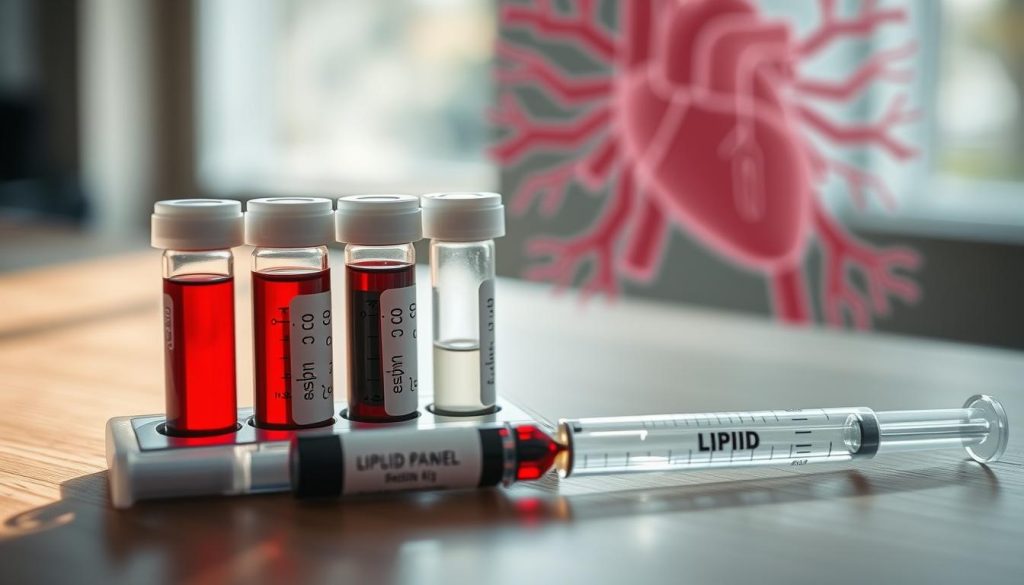
Cardiovascular Risk Assessment Tools
Doctors use special tools to check your heart risk. These tools look at your age, gender, blood pressure, and smoking habits, along with your cholesterol levels. They use this info to guess your chance of getting heart disease.
Regular Screening Recommendations
Getting your cholesterol checked is a big part of staying healthy. Adults should get their cholesterol tested every 4-6 years, starting at age 20. If you have risk factors or a family history of heart disease, your doctor might want you to get tested more often.
Regular check-ups are important to catch problems early. Just like knowing about COVID-19, keeping an eye on your cholesterol is key for your heart’s health.
| Age Group | Recommended Screening Frequency |
|---|---|
| 20-39 years | Every 4-6 years |
| 40-75 years | Annually or as advised by doctor |
| 75+ years | As recommended by healthcare provider |
By following these guidelines and working with your healthcare provider, you can manage your cholesterol and lower your heart disease risk.
Treatment Approaches for Managing High Cholesterol
Managing cholesterol is key to preventing heart disease. Doctors use various treatments to help control cholesterol levels. This reduces the risk of heart problems.

Statins are the top choice for treating high cholesterol. They block a key substance needed for making cholesterol. This can lower LDL cholesterol by 20% to 55%, depending on the drug and dose.
For those who can’t take statins or need extra help, other treatments are available:
- Bile acid sequestrants
- Cholesterol absorption inhibitors
- PCSK9 inhibitors
- Fibrates
Changing your lifestyle is also important for managing cholesterol. Eating right, exercising, and keeping a healthy weight can help a lot. Some people might reach their cholesterol goals just by changing their lifestyle. Others might need to take medication and make lifestyle changes.
“Cholesterol management is not one-size-fits-all. We tailor treatment plans to each patient’s unique needs and risk factors.”
It’s important to have regular check-ups and follow-ups. These visits help doctors see if treatments are working. They can then make changes to keep your heart healthy.
Lifestyle Modifications for Cholesterol Control
Starting your journey to better heart health is easy. Making smart lifestyle choices can greatly improve your cholesterol levels. This includes changing your diet, being more active, and managing stress.
Dietary Changes and Nutrition Guidelines
Eating right is key to controlling cholesterol. Choose foods high in fiber, lean proteins, and healthy fats. Add lots of fruits, veggies, whole grains, and fish to your meals.

Exercise and Physical Activity Benefits
Exercise is vital for keeping cholesterol in check. Aim for 150 minutes of moderate exercise or 75 minutes of vigorous activity weekly. Activities like brisk walking, swimming, or cycling can raise good cholesterol and improve heart health.
Being consistent with exercise is important for its full benefits.
Stress Management Techniques
Stress can harm your cholesterol and heart health. It’s important to find ways to reduce stress. Try meditation, deep breathing, or yoga to lower stress.
Also, taking care of yourself and balancing work and life can help your heart health.
“Taking small steps towards a healthier lifestyle can lead to big improvements in your cholesterol levels and heart health.”
Combining lifestyle changes with any medications can help manage cholesterol and protect your heart. Remember, even small changes can make a big difference in your health.
Medications Used to Combat High Cholesterol
When lifestyle changes aren’t enough, doctors often turn to cholesterol-lowering drugs to help manage unhealthy levels. Statins are the most common lipid-lowering medications prescribed. These powerful drugs work by blocking a substance your body needs to make cholesterol.
They effectively lower LDL (bad) cholesterol and triglycerides while raising HDL (good) cholesterol.
Other types of cholesterol-lowering drugs include bile acid sequestrants, which remove cholesterol from the bloodstream. PCSK9 inhibitors help the liver clear LDL cholesterol. Ezetimibe limits cholesterol absorption in the small intestine.
Each medication targets cholesterol differently, allowing healthcare providers to tailor treatment to individual needs.
Cardiovascular pharmacology has advanced significantly, with various options for managing high cholesterol. While statins remain the go-to choice, combination therapies are becoming more common. These might include a statin paired with another lipid-lowering medication for enhanced effectiveness.
It’s important to work closely with your doctor to find the right medication or combination that suits your specific health profile and goals.
Remember, medication is just one part of a broader approach to heart health. Regular blood tests to monitor cholesterol levels and overall cardiovascular health are essential. By combining prescribed medications with a heart-healthy lifestyle, you can significantly reduce your risk of cardiovascular disease and improve your long-term health outlook.
FAQ
Q: Is high cholesterol itself considered a cardiovascular disease?
A: High cholesterol isn’t a cardiovascular disease itself. But, it’s a big risk factor for them. It helps form plaque in arteries, leading to atherosclerosis, a cardiovascular disease.
Q: What’s the difference between HDL and LDL cholesterol?
A: HDL, or “good” cholesterol, helps remove excess cholesterol. LDL, or “bad” cholesterol, can cause plaque buildup. Keeping HDL high and LDL low is key for heart health.
Q: How does high cholesterol lead to atherosclerosis?
A: High cholesterol, mainly LDL, causes plaque buildup. This narrows arteries, restricting blood flow. It increases the risk of heart attacks and strokes.
Q: What are the main risk factors for high cholesterol?
A: High cholesterol risks include a diet full of saturated fats and trans fats. Lack of exercise, obesity, smoking, age, and genetics also play a part. Diabetes and hypothyroidism can raise cholesterol levels too.
Q: How is high cholesterol diagnosed?
A: A blood test called a lipid panel diagnoses high cholesterol. It measures total cholesterol, LDL, HDL, and triglycerides. Adults over 20 should get tested regularly, based on risk factors and past results.
Q: What lifestyle changes can help manage high cholesterol?
A: To manage high cholesterol, eat a heart-healthy diet and exercise regularly. Aim for 150 minutes of moderate activity weekly. Maintain a healthy weight, quit smoking, and manage stress with meditation or yoga.
Q: What medications are commonly used to treat high cholesterol?
A: Statins are the most common treatment for high cholesterol. They block a substance needed for cholesterol production. Other options include bile acid sequestrants, cholesterol absorption inhibitors, and PCSK9 inhibitors. The right medication depends on your health and cholesterol levels.
Q: Can high cholesterol be completely cured?
A: High cholesterol can’t be “cured” in the traditional sense. But, it can be managed with lifestyle changes and medication. Proper management can keep cholesterol levels healthy, reducing cardiovascular disease risk.
Q: How often should I have my cholesterol levels checked?
A: Most adults should get cholesterol screening every 4 to 6 years. If you have heart disease risk factors or high cholesterol history, your doctor may suggest more frequent tests. Always follow your doctor’s advice on screening frequency.
Q: Can children have high cholesterol?
A: Yes, children can have high cholesterol. It’s often due to genetics or obesity. The American Academy of Pediatrics recommends cholesterol screening for kids between 9 and 11, and again between 17 and 21. Earlier screening may be needed for kids with risk factors.












